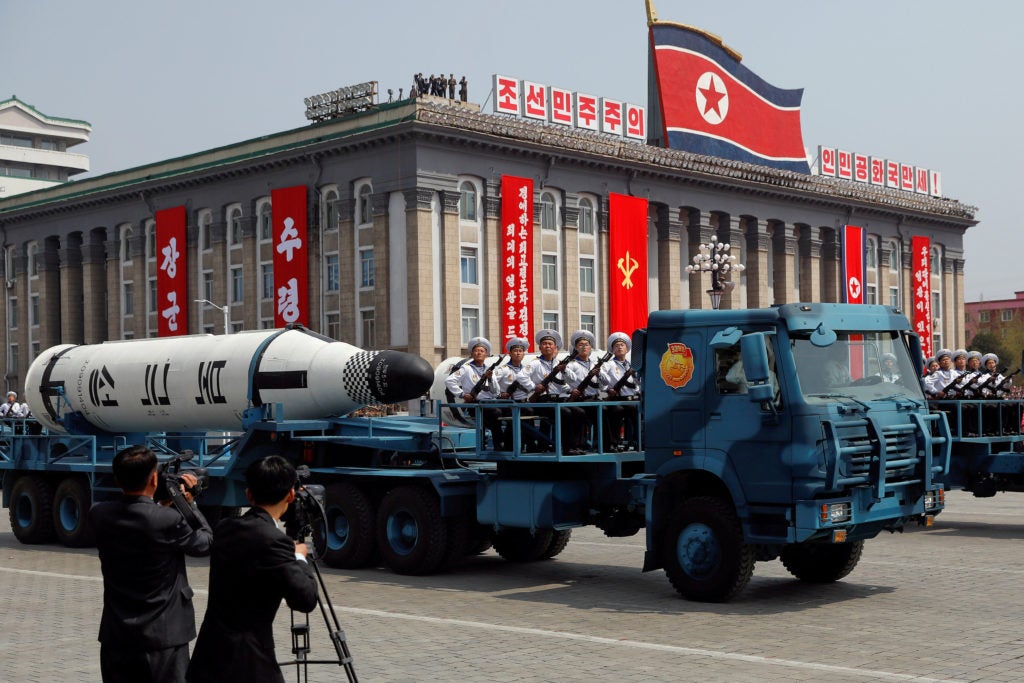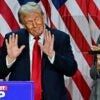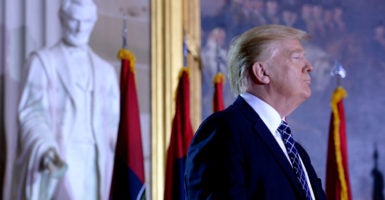In his first 100 days, President Donald Trump—who campaigned on an “America first” platform—has used the power of his office to act on the world stage.
He’s approved the launch of 59 Tomahawk cruise missiles against the Syrian regime of Bashar Assad in retaliation for a deadly chemical weapons attack on civilians.
He’s accelerated the fight against terrorism, dictating more power to the military as it continues the Obama administration campaign of airstrikes and limited on-the-ground support for local forces combating ISIS and al-Qaeda. Trump’s empowering of the military was perhaps most visible when the top U.S. commander in Afghanistan, Gen. John W. Nicholson Jr., dropped what the Pentagon has nicknamed the “mother of all bombs” on an ISIS cave complex in Afghanistan.
The Trump administration has also pressured China to help limit the nuclear and missile capability of North Korea, using strong rhetoric against both countries.
Foreign policy and national security analysts say it’s difficult to evaluate the meaning of these actions, and others, until the Trump administration, which has been slow to hire State and Defense Department staff, reveals overarching strategies to confront the world’s crises.
“The word that comes to mind when I think of his foreign policy in these first 100 days is tactical,” said Jasmine El-Gamal, a senior fellow at the Atlantic Council who has worked for the Pentagon as an adviser on Middle East issues.
“Everything seems to be a reaction to something without being placed into a larger context, and that makes it really hard to understand the direction he is headed,” El-Gamal told The Daily Signal in an interview.
Even if it’s hard to decipher the actions of an outsider president who threatened to take a tougher approach to allies and enemies alike in the campaign, analysts say Trump has strived to showcase areas of contrast with his predecessor, President Barack Obama.
“What the president has managed to do is begin to restore the credibility and deterrence of the United States, which is very important because both were largely eroded over the last eight years,” said Clifford May, the president of the Foundation for Defense of Democracies, in an interview with The Daily Signal.
In trying to project an image of a decisive—yet unpredictable—leader, critics say the Trump administration has failed to present a coherent foreign policy.
“There is no real core body of principles other than a transactional view of the world, which is how he approaches everything,” said Eliot Cohen, a former counselor to Secretary of State Condoleezza Rice, in an interview with The Daily Signal.
Victoria Coates, a senior director for strategic communications at the National Security Council and special assistant to Trump, described the president’s foreign policy as “very focused on American priorities” while also cognizant of international obligations.
“He thinks about the U.S. in terms of being an aspirational nation—that this country is an example to the rest of the world, and the best thing we can do for the world is to keep America strong and secure,” Coates told The Daily Signal in an interview. “He is an international businessman. He is not looking to shut out the rest of the world. But he is very focused on American priorities and interests.”
Below is a recap of foreign policy and national security actions and themes from the first 100 days of the Trump administration, and what they say about the president’s evolving approach to the world.
Syria Strike and the Middle East
Trump’s approval of a strike against a Syrian air base this month—the first direct assault on the Assad regime in six years of civil war—was the most dramatic foreign policy action of Trump’s first 100 days.
The fast action was cheered by allies and establishment foreign policy thinkers who described it as indicative of Trump’s flexibility to react to events as they happen, and to lean on his team of national security advisers.
But analysts say Trump’s decision to strike, and immerse himself into a war he strived to avoid, has also presented new questions about how the administration will balance the dual challenges of fighting ISIS, and managing the future of Assad, whose brutality many blame for inflaming terrorism in the region.
“The Syria strike was a one-off spasm to a particularly hideous crime, and Trump did the right thing, but firing a few missiles does not a policy make,” Cohen said.

The Syrian regime of Bashar Assad is blamed for inflaming terrorism in the Middle East. (Photo: Omar Sanadiki/Reuters/Newscom)
Since the strike, the Trump administration, depending on who’s talking, has communicated different views on its priorities in Syria.
“The Syria strike was a very powerful signal that there is a new sheriff in town who doesn’t mess around and will do things differently, but again, that’s optics and tactics,” Middle East expert El-Gamal said. “If you look on the ground in Syria, not much has changed. People are still dying every day; there’s been reports of chlorine attacks by the Assad regime. Whether the strike represents a shift from the Obama administration’s reluctance to get involved in the Middle East is not clear yet.”
>>> After Missile Attack, the Challenges Facing Trump in Syria
The Trump administration insists the missile strike in Syria was not meant as a significant policy shift away from its primary focus of defeating ISIS, and consistent with the president’s priority of acting in America’s interest first.
“The president has been very clear he is not planning to overthrow Assad by military force,” Coates told The Daily Signal. “This is not a return to Iraq or Afghanistan in terms of regime change. ISIS is interested in attacking the U.S., and has inspired attacks on the homeland, so that has to be the top priority. But the president wants Assad to at least think twice before using chemical weapons again, and we’ve been clear we’d like to see a negotiated political settlement in Syria.”
Beyond Syria, Trump has moved to tighten relations with traditional Middle East allies such as Egypt and Saudi Arabia, overlooking human rights issues in those countries to partner with them in the fight against terrorism. The Trump administration has also adopted a more adversarial approach to Iran, by quickly imposing sanctions on entities and individuals involved in Tehran’s ballistic missile program.
Trump has for now kept in place the Obama administration’s nuclear deal with Iran, but the administration says it is reviewing the agreement.
“Trump has very vividly embraced some of our longstanding traditional partners in the region, while also putting Iran on notice,” said Brian Katulis, a foreign policy analyst at the Center for American Progress, a liberal think tank, in an interview with The Daily Signal.
Contesting North Korea Threat
Trump has sought to take a tougher tone on North Korea after its latest weapons tests, including a failed missile test this month.
Speaking to United Nations ambassadors on Monday, Trump said “the status quo in North Korea is also unacceptable,” and that the U.N. Security Council must be prepared to impose additional and stronger sanctions on the country.
Secretary of State Rex Tillerson has said that all options are on the table—including military action—and that the time for “strategic patience” is over.
Perhaps most significantly, Trump, like predecessors before him, has aimed to pressure China, North Korea’s powerful neighbor, to use its economic leverage over the Kim Jong Un regime.

A North Korean navy truck carries a submarine-launched ballistic missile during a military parade marking the 105th birth anniversary of the country’s founder. (Photo: Damir Sagolj/Reuters/Newscom)
In a new approach, Trump has explicitly threatened to punish China for its trade practices if Chinese President Xi Jinping doesn’t act to restrain North Korea. China says it has already suspended all coal imports from North Korea. North Korea, meanwhile, has responded to the Trump administration’s calls for more aggressive action with tough rhetoric of its own. The country’s foreign ministry recently released a statement saying “such intimidation and blackmail can never frighten” North Korea.
“We have no good options with North Korea, but the best of the options is to get China to feel some sense of responsibility to get serious about its client next store,” May, of the Foundation for Defense of Democracies, said.
“From Trump, we have seen important carrots and sticks,” May added. “Trump having dinner with Xi when he announced the Syria strike probably alerted Xi to the idea this is a different kind of administration. Trump is making a serious attempt to make Xi consider, maybe I need to do something in North Korea because I can’t get away with not doing anything.”
Others are more cautious in evaluating Trump’s reliance on China to deter North Korea.
“The Trump administration will go down that hole and realize they will come to the same place that everyone else has, that the Chinese won’t be the ones to bring down the North Korean regime,” Cohen said.
Relations With Europe and Russia
Trump has walked back contrarian views he took in the campaign against Western institutions such as NATO and the European Union.
The president recently said NATO is “no longer obsolete” and he took credit for recent commitments by some member countries to pay more for defense.
The Trump administration’s level of commitment to the European Union has been less transparent, at a moment when populist parties across the continent are contesting the idea of European integration.
“It is very much up to the individual countries of Europe whether they wish to remain in the EU or not, and the U.S. will continue to deal with the EU and look for relationships with individual nation-states to pursue our interests,” Coates told The Daily Signal.
As Russia continues its campaign of election interference in the West, and refused to buck its support for Assad in Syria, Trump has proceeded more cautiously with his campaign promise to improve relations with Moscow. Earlier this month, Trump referred to relations with Russia as being at an “all-time low.”
The FBI and House and Senate intelligence committees are currently investigating Russia’s meddling in the U.S. election, including potential links between Moscow and the Trump campaign.
“The issues we have encountered have been on the Russian side,” Coates said. “Moscow continues to wreak havoc in eastern Ukraine, continues to enable and empower Assad, and we don’t think that’s helpful. Certainly, we are willing to work with Russia on counterterrorism issues, and we remain interested in the possibilities, but as Secretary of State Tillerson made extremely clear on his recent visit to Moscow, this is a two-way street.”
Military Emphasis
In addition to delegating more authority to the military, Trump has committed to providing the armed forces with more funding.
Trump’s budget proposal seeks to increase defense spending by $54 billion.
In contrast, the budget for the State Department and the Agency for International Development, or USAID, would be cut by 28 percent.
Katulis said the Trump administration must support its increasing military efforts with a “day after” strategy to help resolve underlying political and sectarian disputes that drive violence in places like Iraq, Syria, and Yemen.
“If we are gutting and cutting the State Department that is trying to help these countries on non-military fronts, what that may be doing in the Middle East is signaling a military-centric strategy that does not confront the core issues that are at the heart of terrorism,” Katulis said.
James Carafano, a foreign policy expert at The Heritage Foundation, says that Trump’s national security team, including Defense Secretary James Mattis and H.R. McMaster, the national security adviser, appreciates the importance of diplomacy more than most generals.
“The generals he’s selected recognize the importance of statecraft and diplomacy,” said Carafano, who advised the Trump campaign and transition team on foreign policy. “These would be the first generals to tell you generals can’t do it all.”
Carafano notes that Nikki Haley, Trump’s ambassador to the U.N., has used her perch to call for diplomatic resolutions to the war in Syria.
“This administration has shown a commitment to peace through strength, and is being constructive in the balancing of soft and hard power,” Carafano said. “The proposed State Department cuts are less about diminishing the soft power instruments. It’s about right-sizing them and focusing them on the core job of statecraft.”
Cohen said the most telling evidence of Trump’s foreign policy will show itself when the president inevitably confronts a crisis he doesn’t expect.
“My sense is what he is doing is listening to his military advisers who have a fairly standard set of views,” Cohen said. “I think Trump is going to be inclined to be hands-off until something blows up in his face, and then he will be hands-on. He will be at the mercy of events, like all presidents are.”




























